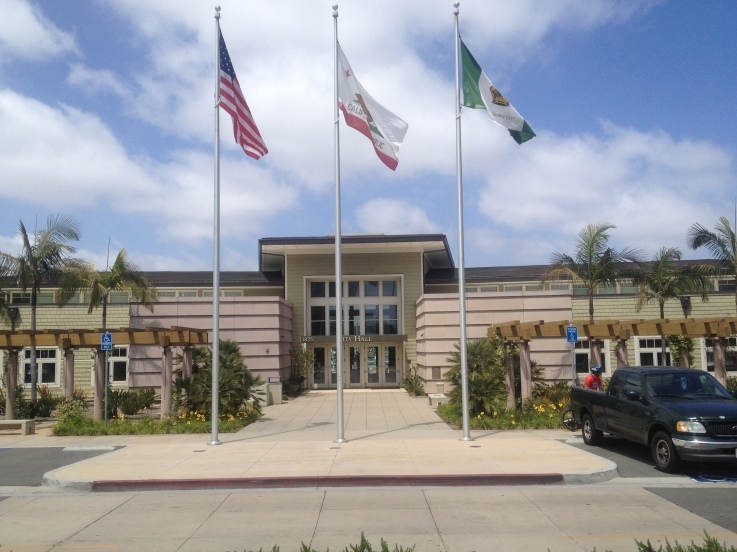Speed Cameras
Speed cameras won’t be coming to Coronado anytime soon, the city’s lobbyist in Sacramento Jonathan Clay told the council.
There was some hope that one might be introduced by Jim Beall (D-Sacramento), transportation committee chairman, at the behest of the cities of San Francisco and San Jose. He backed off because of opposition by the Automobile Club, Governor Jerry Brown and the California Highway Patrol.
“Folks don’t have the stomach to take it on this year,” Clay told the city council.
Bill Sandke had proposed installing them on Third and Fourth Streets between the bridge and Orange Avenue to slow traffic and improve safety in that corridor. Because speed cameras are illegal in California, legislation was necessary.
Campaign Finance and Credit Cards
Resident Harold Myers shed a bit more light on why he thinks Richard Bailey asked his colleagues on the city council to consider changing Coronado’s campaign finance ordinance to allow credit card contributions at the March 15 city council meeting.
Bailey was already accepting them as part of his online fund raising efforts. “Of $12,600 donated to Bailey last year over $5,000 were credit card donations according to Stripe.com,“ Myers said. He did this, Myers alleged, with full knowledge of the city’s rules.
“Last November I tried to advise Bailey that credit card contributions were illegal, but he persisted in taking them.” Myers said
While Bailey is no longer soliciting credit cards donations, he still needs to return all contributions and show the receipts under the city’s campaign ordinance. “In small town like Coronado, elections have to be squeaky clean,” Myers said.
Bailey admits that up until recently he did take credit card donations despite Myers’ warning. He only took the option off his campaign website after the city council refused to even consider Bailey’s request to change Coronado campaign finance ordinance to allow for electronic contributions.
“This such a trivial issue I just didn’t want it to be a distraction anymore so I removed the option,” Bailey said. “The FPPC [Federal Political Practices Commission] decided years ago that electronic contributions are legal and in compliance with state reporting requirements. Every city in the county of San Diego allows for electronic contributions because they are as traceable as personal checks.”
The information the gentleman [Myers] collected simply proves that credit card contributions are traceable or he wouldn’t have been able to find them, Bailey said, adding that “all the filings are made in accordance by state law.”
Myers insisted that it is more difficult to authenticate a credit card than a personal check. “Card numbers can have different owners. For example a person could pay with a corporate credit card. The files would list the individual, not the corporate entity that actually give the money.”
“With a personal check there are three methods of authentication: name on the check, the check number and the person’s signature,” Myers added. Online credit card transactions do not require a signature, or any proof that you’re the one authorized to use the card.
As the political season heats up, residents can expect to hear more about this issue of money over the next few months. It is as the late Speaker of the California Assembly Jess Unruh said: “Money is the mother’s milk of politics.”
The Gateway Project Stalled Again
Mayor Casey Tanaka wanted a more grandiose plan than the “preserve and improve” idea that simply adds landscaping and narrows the right-of-way, along with a commitment to make the area more pedestrian and bicycle friendly.
Bailey pointed out that the preserve and improve approach “created a framework and we can color within the lines to give us something great.”
After hectoring the council for close to 90 minutes, he got the council to agree to a two month continuation to see if a better plan might be devised.
The city has been looking at redesigning the toll plaza for 35 years. In 2013 it rejected what it considered a lackluster design and appointed a council subcommittee to devise something better. It’s now been tasked with giving it one more try.
The council also rejected an opportunity to take ownership of the two state highways that cut though the city – routes 75 and 282 – from Caltrans. The vote was 4-1 with Bill Sandke opposing.
Assembly member Toni Atkins plans to introduce a bill that would relinquish the state highways to local control at the behest of Imperial Beach. She only recently added Coronado to the bill. Because it was an afterthought in the process, Tanaka rejected the idea out of hand. “We get more leverage if we request it ourselves,” Tanaka said.
While agreeing with the Mayor on Atkins’ bill, Bailey proposed further discussion on the issue and suggested asking Caltrans for an appraisal risk involved with relinquishment. Tanaka shut him down. “I don’t want to send a signal that we want it,” he said.





